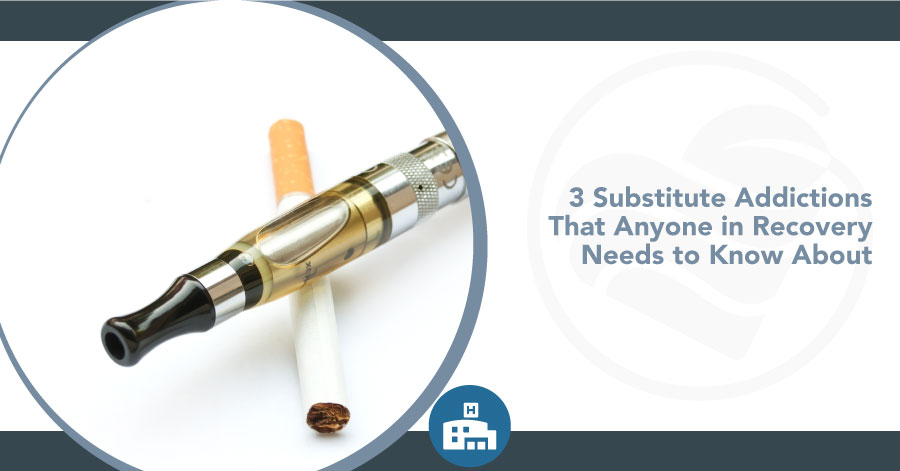
Since 1999, over 760,000 people have died from a drug overdose. This statistic leads many individuals to seek help for their substance use disorder, but addiction replacement behaviors often emerge during recovery. While replacing one addiction with another may provide temporary relief, it’s important to know the facts before taking up smoking or hitting the gym excessively.
What Are Substitute Addictions?
Substitute addiction, also called “replacement addiction” or “transfer addiction,” is a simple concept. It occurs when a person in recovery replaces one compulsive behavior with another. In most cases, the new behavior is thought to come with less risk. Revisiting the common example of substituting tobacco for other substances to help with sobriety, the belief is that while smoking comes with its own set of risks, those risks are less severe than the risks of the behavior smoking replaced. This is the main theory behind substitute disorder and helps explain why this can sometimes be considered a beneficial influence on a person’s life.
It’s not difficult to understand the logic behind substitute addictions. In rehab, people are taught to find new outlets and coping mechanisms for negative thoughts and emotions instead of using drugs and alcohol. Many who struggle with addiction have naturally compulsive personalities — they’re more prone to developing an inability to stop a behavior that gives them positive feedback.
Are Addiction Replacement Behaviors Safe?
Many people with a substance use disorder start smoking while they’re in recovery. While smoking increases the risk of cancer, lung disease, heart disease and diabetes, some therapists permit smoking when it helps individuals deal with their cravings. Smoking cigarettes is still safer than using meth, heroin or crack cocaine.
Caffeine is less dangerous than tobacco, but excessive use could lead to increased heart rate, anxiety, nausea, headaches, insomnia and high blood pressure. Exercise can be a healthy addiction replacement if reasonable goals are set, but pushing too far could injure the body. Anyone taking prescription drugs during recovery must stick to the required dosage to avoid cross-addiction.
Overall, replacing one addiction with another is common, but it must be done under a therapist’s guidance to avoid the development of a new disorder.
Common Substitute Addictions
Any addiction can be substituted for any other. With that in mind, here are some of the most common replacement addictions.
1. Other Drugs and Prescription Medications
Sometimes, drugs and medications used to help a person stop one addiction can be the start of another. For example, marijuana is increasingly used as a tool to help treat pain, which gives it potential as a resource in recovery from opiate addiction. However, compulsive marijuana use comes with its own hazards and health risks.
Benzos are often used to ease the side effects, namely anxiety and depression, of withdrawal from alcohol, but may cause a new addiction in the process. This is a case where the replacement substance may be more hazardous than the one it replaced.
2. Food
Binge eating disorders act as a type of compulsion that walks the line between behavior and substance disorders. Many people find that when they get off drugs, they can enjoy food again, which is a positive. Sometimes this can be taken to the opposite extreme, though, and they find themselves living with constant cravings for high-fat, high-carbohydrate foods. Being controlled by urges to eat isn’t a positive experience, and binge eating tends to lead to other unhealthy outcomes.
3. Exercising, Working, and Other Behaviors
A host of other behaviors that provide positive emotional feedback can become outlets — and compulsions — for those looking for alternative coping methods during recovery. Some, such as exercise and work, are viewed as positive. Others, including gambling and sex, are considered to be less productive. However, separating these behaviors into categories of good and bad oversimplifies a complex issue. One of the major factors people should be aware of about substitute addictions is that it’s never good to rely on one behavior to control the ability to feel pleasure in life. That’s why it’s important to acknowledge the pitfalls, even in “healthy” substitutes, and do everything in moderation.
Learn More About Substitute Disorder
Substitute addictions are so common that many people experiencing them may be unaware they’re doing so. If you or a loved one is concerned about a potential compulsive behavior, contact FHE Health today and learn more about substitute addictions and recovery.






